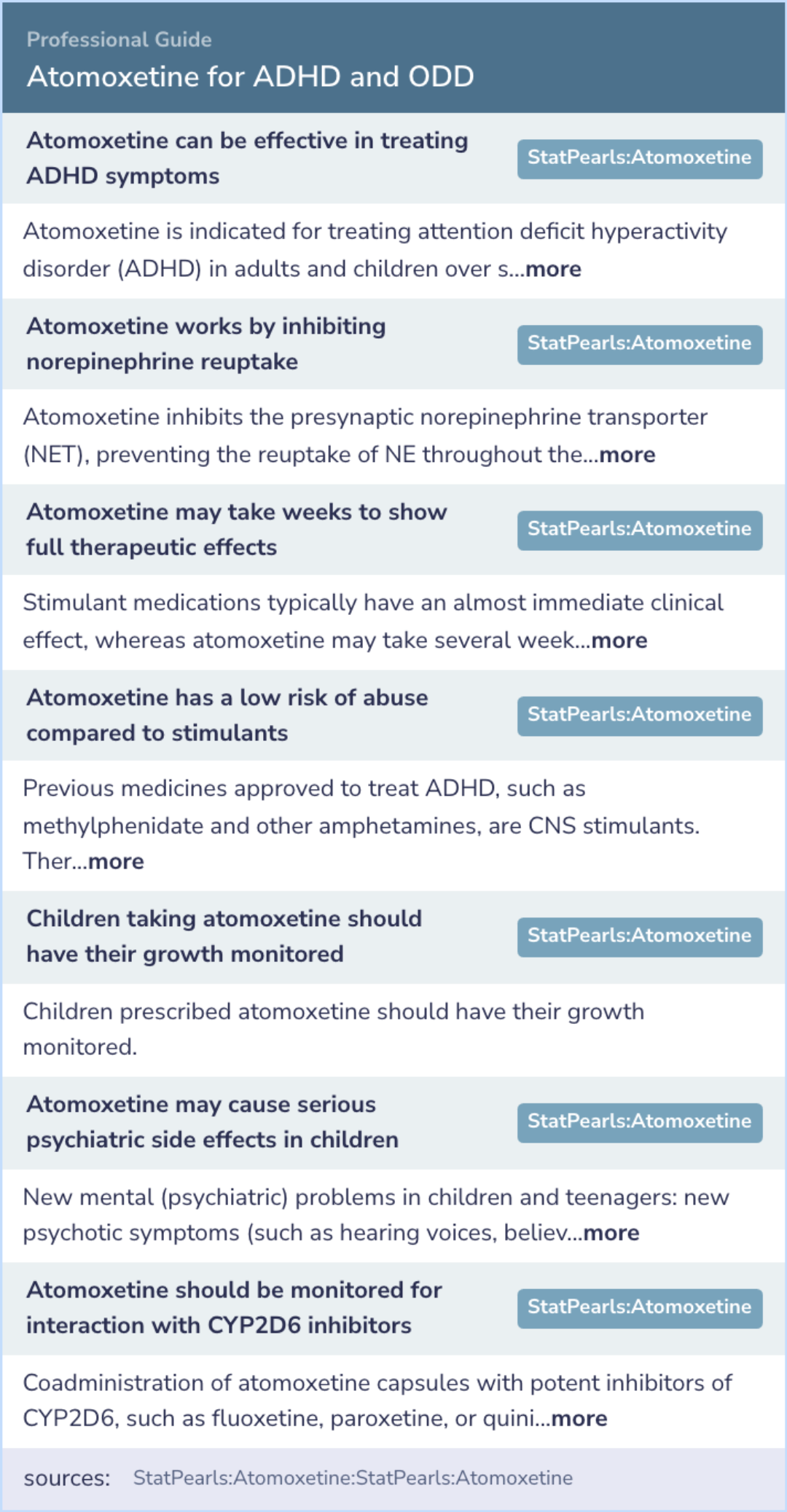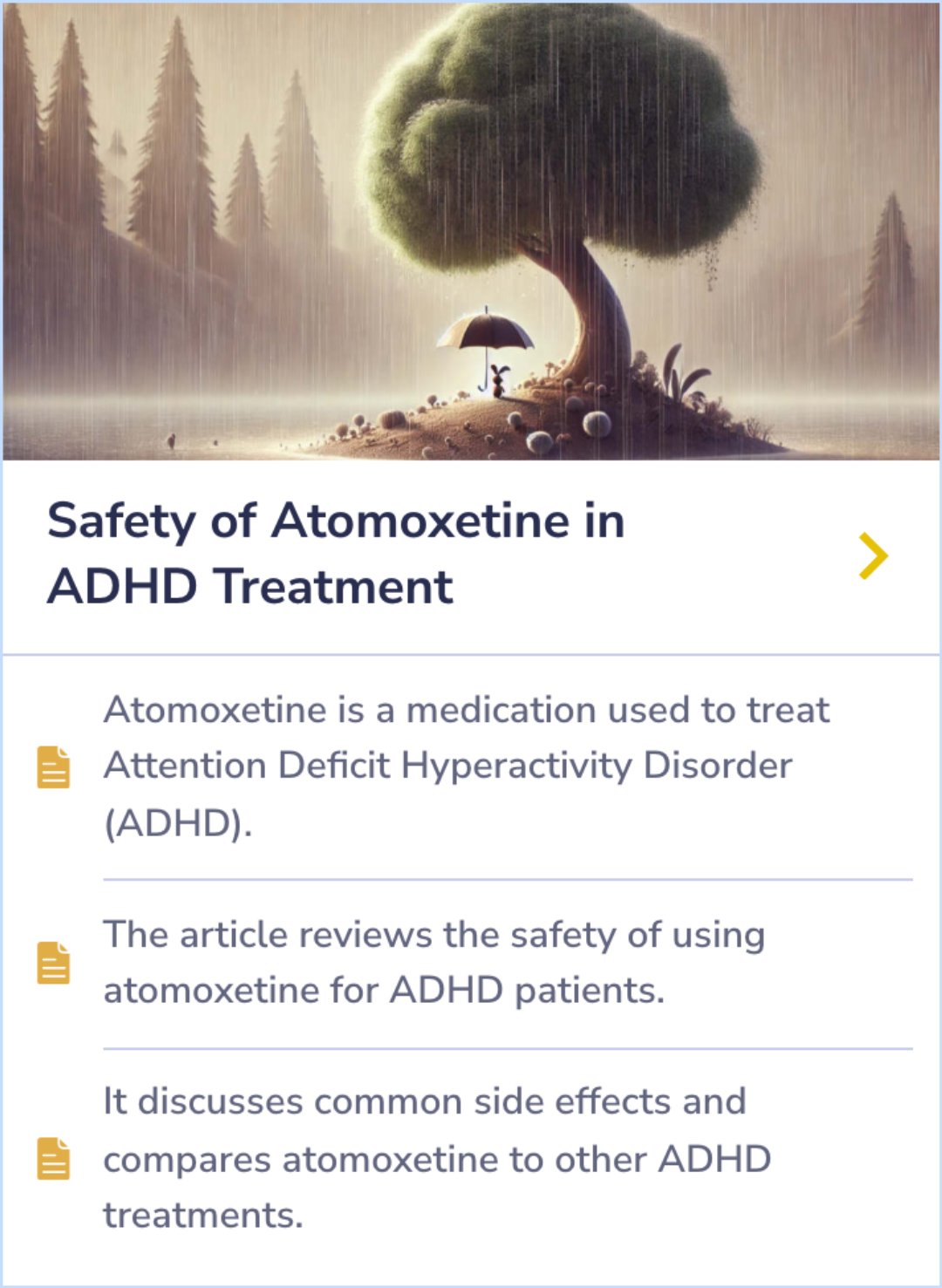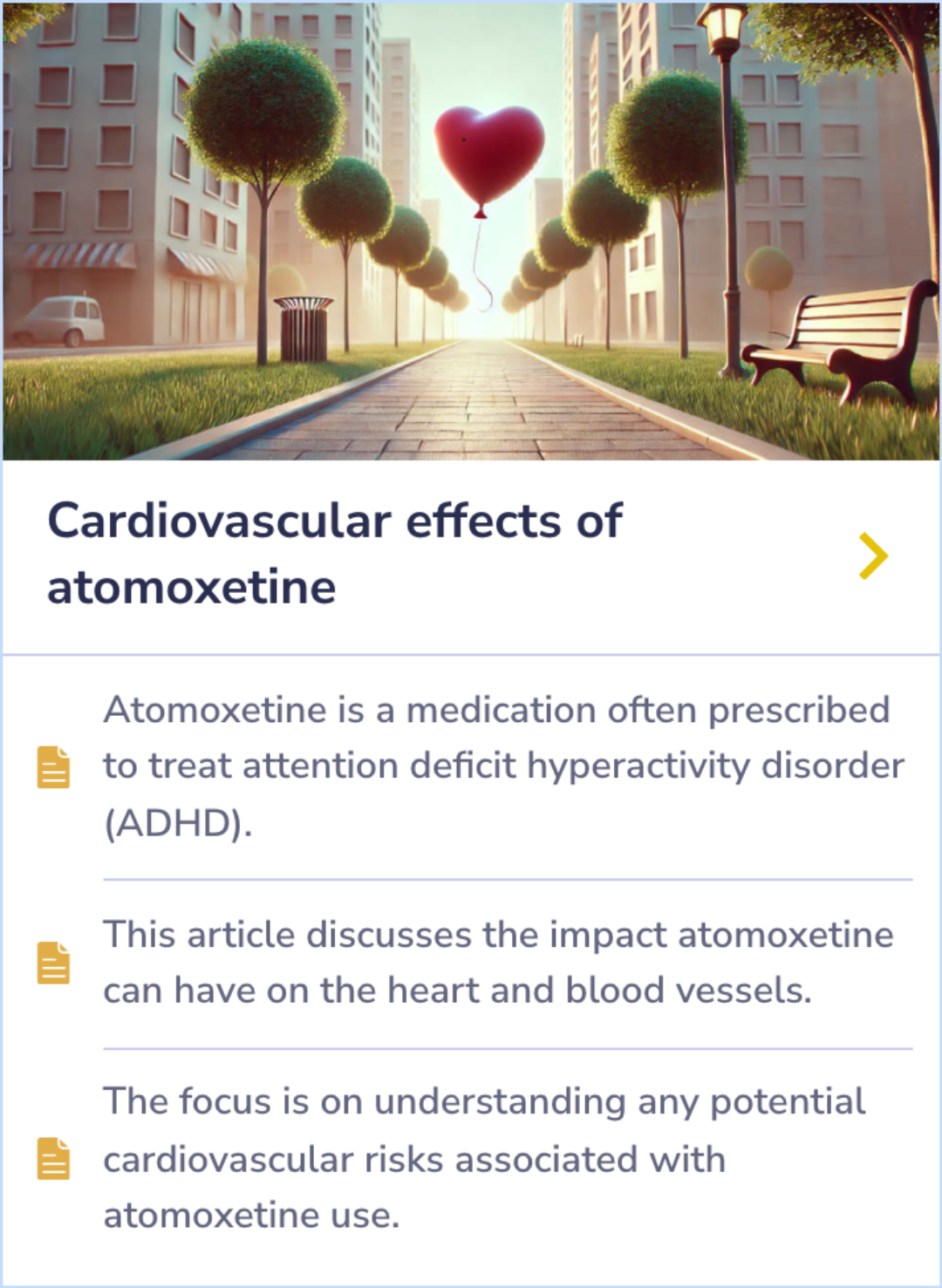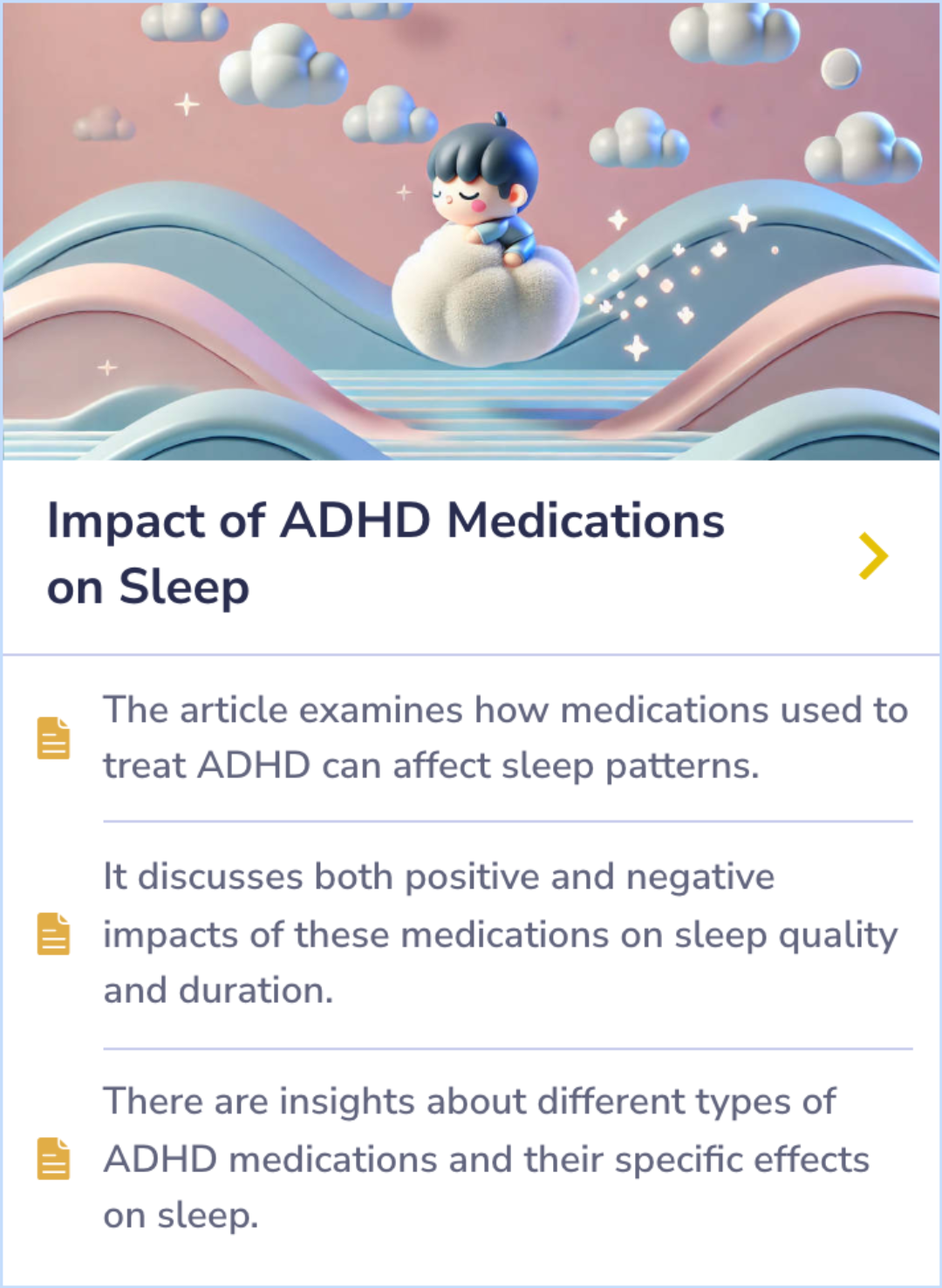Strattera Paper Database
Visual Abstract
Atomoxetine for the treatment of attention-deficit/hyperactivity disorder and oppositional defiant disorder
Atomoxetine for ADHD and ODD
October 25, 2024
author
Bangs ME, Hazell P, Danckaerts M, Hoare P, Coghill DR, Wehmeier PM, Williams DW, Moore RJ, Levine L; Atomoxetine ADHD/ODD Study Group
journal
Pediatrics
Date Published
2008 Feb
Why link to a visual abstract?
What is a visual abstract?
Original
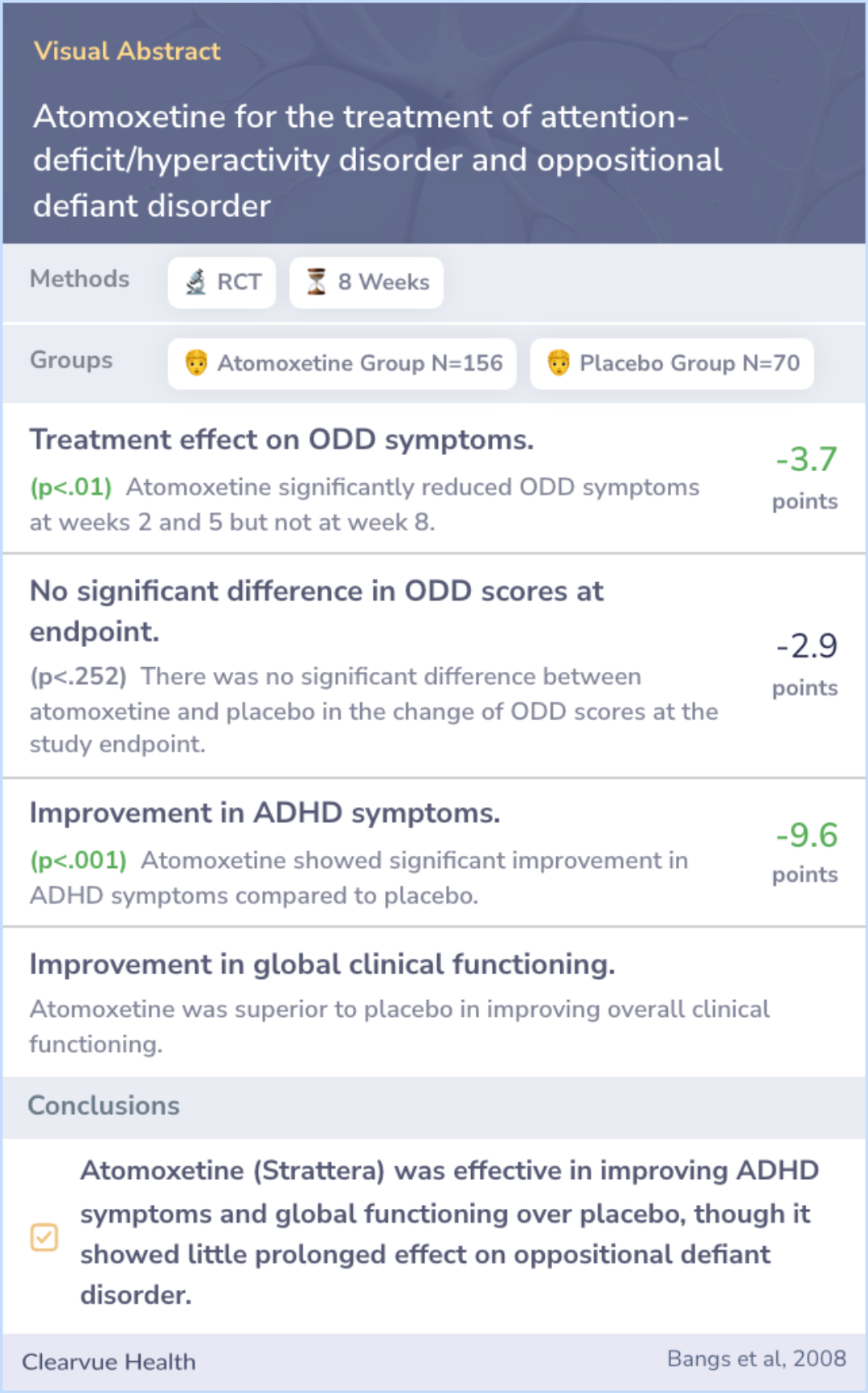
Study Summary
🔬
What They Studied
The study looked at how effective atomoxetine (Strattera) is in treating oppositional defiant disorder along with ADHD in children.
💡
What They Found
The study found that atomoxetine (Strattera) significantly improved ADHD symptoms and global functioning compared to placebo but did not have a clear long-term effect on oppositional defiant disorder.
📚
What This Means
These findings align with current evidence showing that atomoxetine (Strattera) is effective for ADHD treatment but its long-term effect on oppositional defiant disorder remains uncertain.
Study Summary
Study Overview
This study looked into how atomoxetine can help children with ADHD who also have Oppositional Defiant Disorder (ODD). Researchers wanted to understand if atomoxetine effectively reduces symptoms of ODD. Although the study found improvements in ADHD symptoms, it wasn't clear if atomoxetine specifically helped with ODD symptoms. The outcomes suggest that while both conditions can be treated, more approaches might be necessary for ODD.
Overall, the research highlights the complex link between ADHD and ODD, showing that understanding and treating these connected disorders is not straightforward.
Overall, the research highlights the complex link between ADHD and ODD, showing that understanding and treating these connected disorders is not straightforward.
Abstract: background
In this study we examined the effectiveness of atomoxetine for the treatment of oppositional defiant disorder comorbid with attention-deficit/hyperactivity disorder.

Efficacy of Atomoxetine
"The study confirms previous findings that patients with attention-deficit/hyperactivity disorder and comorbid oppositional defiant disorder show statistically and clinically significant improvement in attention-deficit/hyperactivity disorder symptoms and global clinical functioning when treated with atomoxetine."
Treatment Implications
"It remains uncertain whether atomoxetine exerts a specific and enduring effect on ODD symptoms."
Clinical Strategies
"Patients with ADHD and ODD will not be disadvantaged by treatment with atomoxetine, but additional pharmacologic or psychological strategies may need to be used to address the oppositional symptoms."
Study Summary
Methods
The study involved children between 6 and 12 years old, all of whom were diagnosed with ADHD and ODD based on standardized criteria. Participants were divided into two groups, with two-thirds receiving Strattera (atomoxetine) at a specific dose, while the rest received a placebo. The treatment lasted for 8 weeks, and the effectiveness was measured by observing changes in behavior and symptom severity using a specific rating scale.
Researchers carefully tracked the progress of each child to compare the effects of Strattera with the placebo on symptoms of both ADHD and ODD.
Researchers carefully tracked the progress of each child to compare the effects of Strattera with the placebo on symptoms of both ADHD and ODD.
Abstract: methods
Patients were aged 6 to 12 years and met Diagnostic and Statistical Manual of Mental Disorders, Fourth Edition, diagnostic criteria for attention-deficit/hyperactivity disorder with a Swanson, Nolan, and Pelham Rating Scale-Revised attention-deficit/...more

Study Summary
Results
The results showed that children treated with Strattera (atomoxetine) experienced a significant reduction in ADHD symptoms compared to those who received a placebo. While the medication was also somewhat effective in reducing ODD symptoms, the improvement wasn't as consistent over time. Specifically, significant differences in behavior were noted early in the treatment but not at the 8-week mark.
Overall, Strattera was found to improve general clinical functioning more effectively than the placebo, especially concerning ADHD-related symptoms.
Overall, Strattera was found to improve general clinical functioning more effectively than the placebo, especially concerning ADHD-related symptoms.
Abstract: results
Repeated-measures analysis demonstrated a statistically significant difference favoring atomoxetine over placebo in the reduction of Swanson, Nolan, and Pelham Rating Scale-Revised oppositional defiant disorder total scores. There were significant pa...more
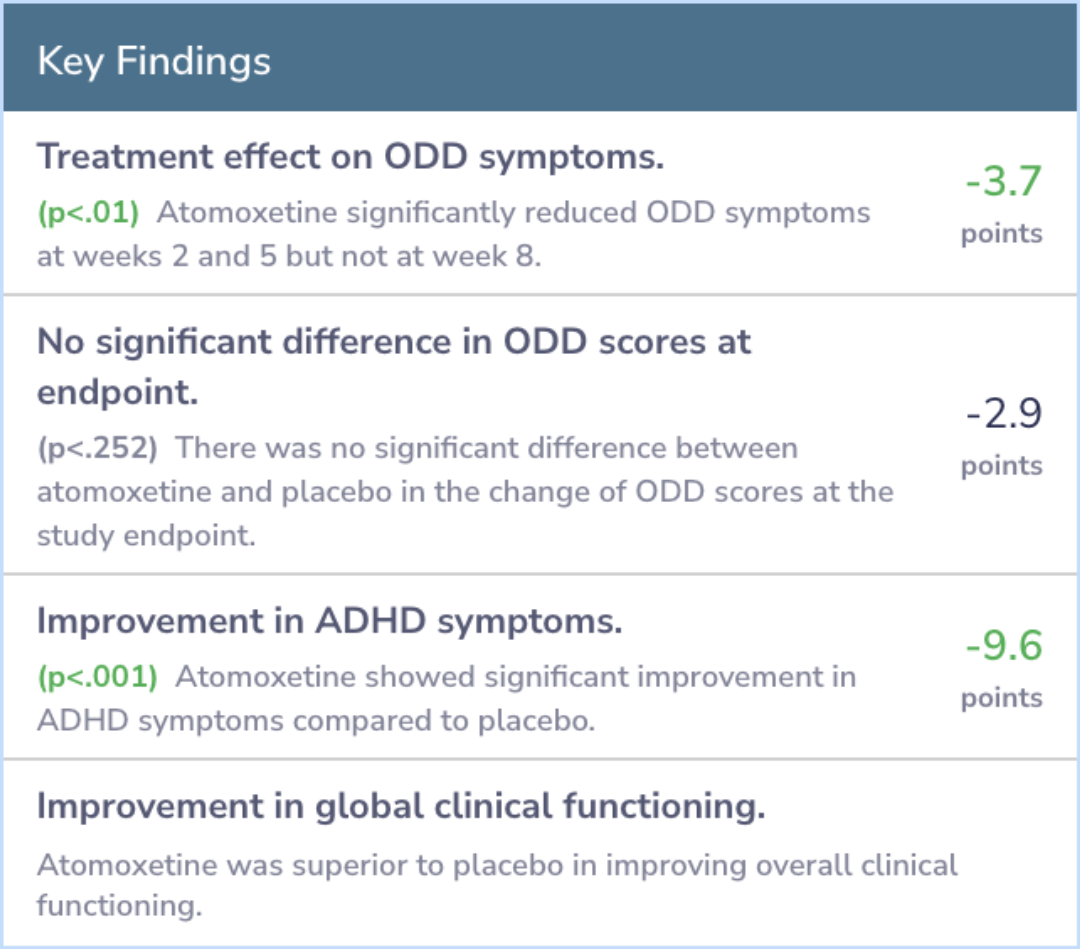
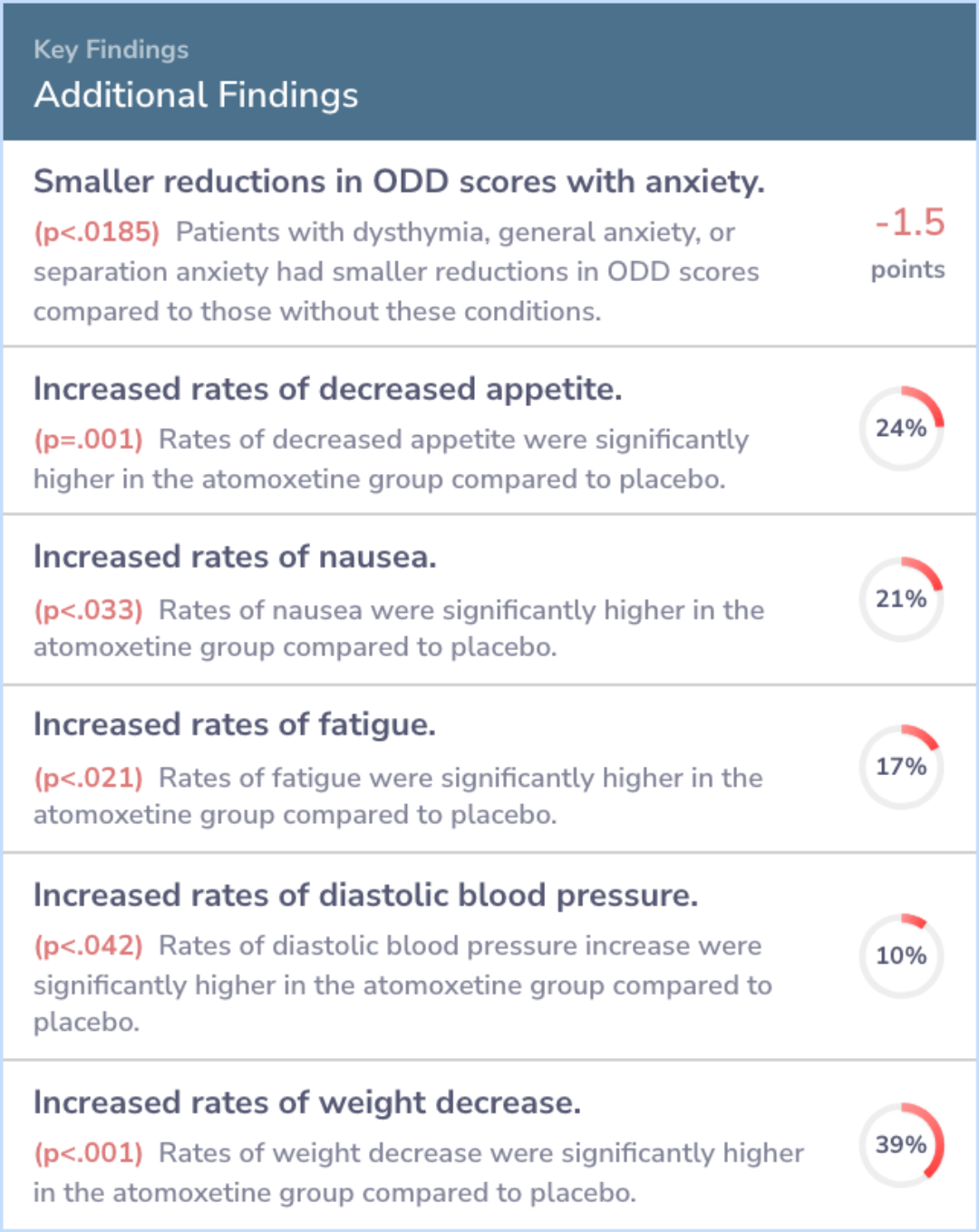
Study Summary
Conclusions
This study supports earlier findings that Strattera (atomoxetine) can significantly improve ADHD symptoms and overall clinical functioning in children with both ADHD and ODD. However, its impact on ODD symptoms remains unclear, particularly over the long term.
While Strattera shows promise as a treatment for ADHD, further research is needed to determine its lasting effects on oppositional defiant disorder symptoms.
While Strattera shows promise as a treatment for ADHD, further research is needed to determine its lasting effects on oppositional defiant disorder symptoms.
Abstract: conclusions
This study confirms previous findings that patients with attention-deficit/hyperactivity disorder and comorbid oppositional defiant disorder show statistically and clinically significant improvement in attention-deficit/hyperactivity disorder symptom...more
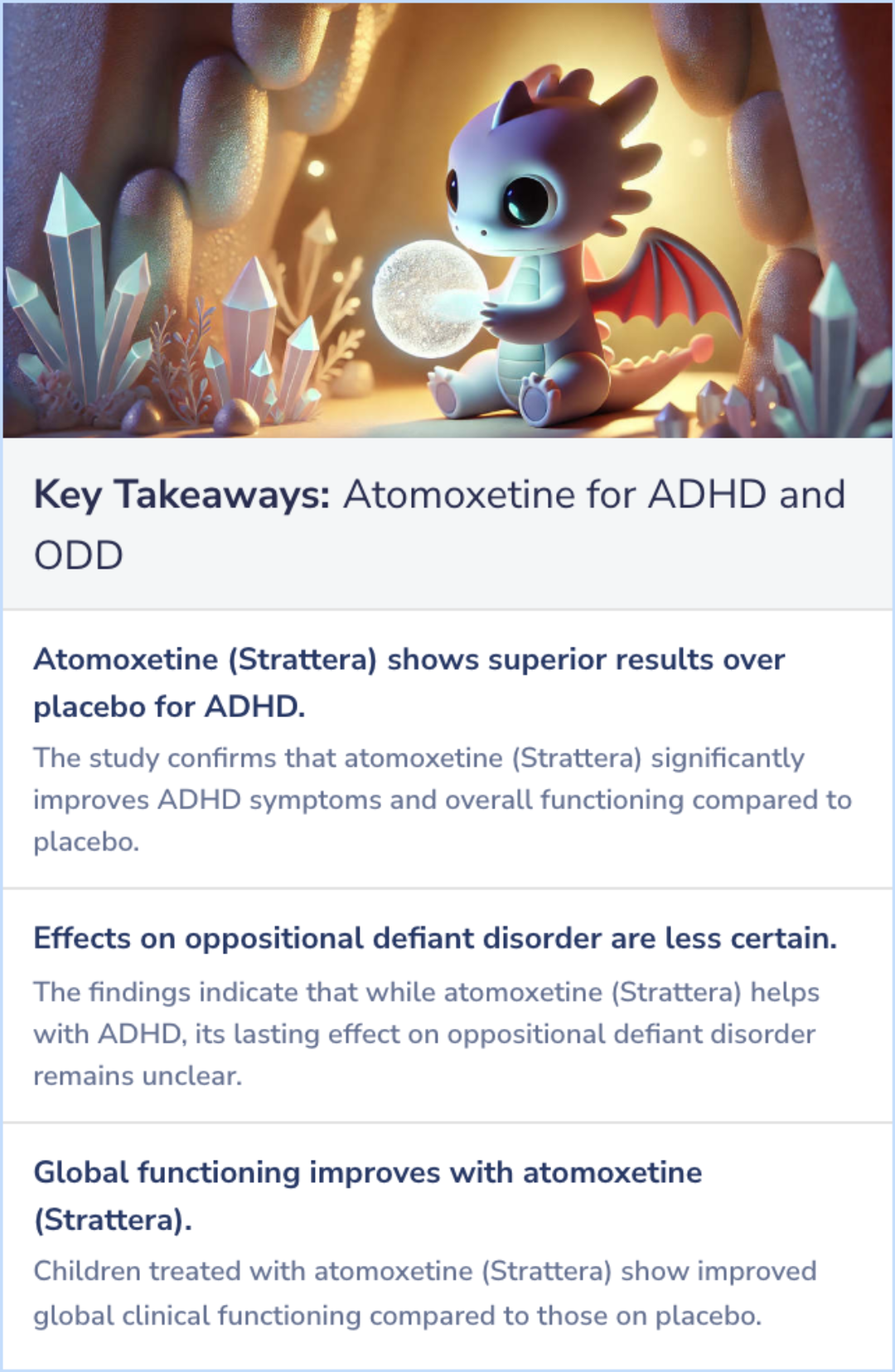
Background Information
Patient Guide
💊
Approved ADHD Use
Strattera is FDA-approved for ADHD treatment in adults and children over six years old.
⚙️
Norepinephrine Inhibitor Mechanism
Atomoxetine selectively inhibits norepinephrine reuptake, impacting ADHD symptom modulation.
🧠
Comprehensive Treatment Approach
Atomoxetine treatment includes psychological, educational, and social interventions.
🧬
Key Pharmacokinetics
Atomoxetine is metabolized mainly by CYP2D6 and has high protein-binding properties.
🤕
Adverse Effects and Risks
Common side effects include headache and insomnia; monitor for serious risks like liver injury.
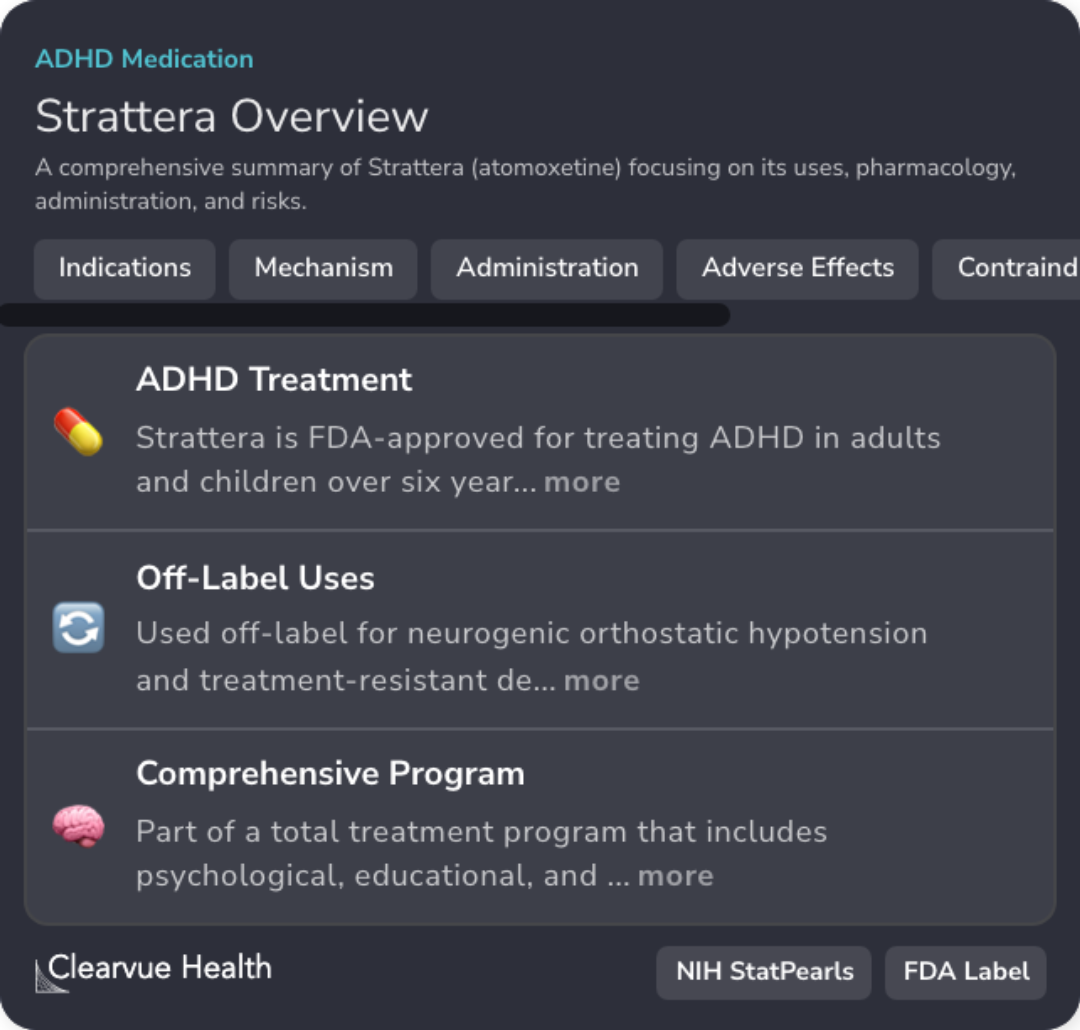
Professional Guide
Expert Opinion: Atomoxetine for ADHD and ODD
In line with findings on atomoxetine's effectiveness, current guidelines affirm its indication for treating ADHD symptoms in children over six.
It acts by inhibiting the norepinephrine transporter, with full therapeutic effects emerging after several weeks.
Unlike stimulants, atomoxetine has a lower risk of abuse.
Monitoring growth and psychiatric effects in children is recommended, as well as adjusting dosages when using CYP2D6 inhibitors.
It acts by inhibiting the norepinephrine transporter, with full therapeutic effects emerging after several weeks.
Unlike stimulants, atomoxetine has a lower risk of abuse.
Monitoring growth and psychiatric effects in children is recommended, as well as adjusting dosages when using CYP2D6 inhibitors.
Evidence Summary
Assessing Atomoxetine's Safety and Side Effects
Atomoxetine, commonly prescribed for ADHD, is assessed here with a focus on its safety. The article details typical side effects and compares these with other ADHD treatments. This offers a clear overview for those exploring medication options.
The comparison highlights both the benefits and potential risks, helping patients and caregivers make informed decisions about using Atomoxetine.
The comparison highlights both the benefits and potential risks, helping patients and caregivers make informed decisions about using Atomoxetine.
Evidence Summary
Exploring Cardiovascular Risks of Atomoxetine
Atomoxetine, a common treatment for ADHD, also affects heart and blood vessels. This content focuses on the cardiovascular risks that might be linked to its use. It outlines the potential heart-related side effects that are important to consider when using this medication.
Understanding the effects on the cardiovascular system is essential for evaluating the overall safety of atomoxetine, beyond its role in managing ADHD symptoms.
Understanding the effects on the cardiovascular system is essential for evaluating the overall safety of atomoxetine, beyond its role in managing ADHD symptoms.
Evidence Summary
ADHD Medications and Their Varied Effects on Sleep
ADHD medications can have a range of effects on sleep. Some improve sleep quality, while others may disrupt it, leading to varying experiences for individuals. Different medication types play distinct roles in how sleep patterns and duration are influenced.
The article dives into both the positive and negative impacts these medications can have on sleep, offering insights into how each type might affect sleep differently.
The article dives into both the positive and negative impacts these medications can have on sleep, offering insights into how each type might affect sleep differently.
